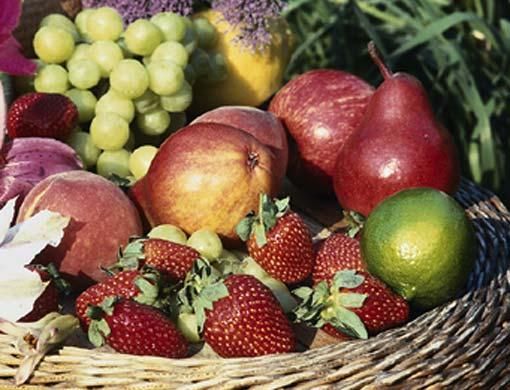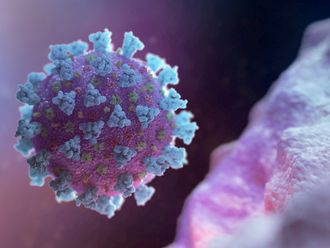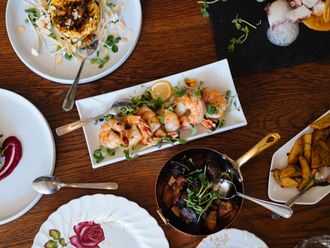Better taste means better health.
If healthy living depends on knowing your body, then knowing what you eat and where it comes from is of equal importance. For quite sometime now the buzzword in health circles has been 'organic'. Appreciated for its superior taste and quality, organic food is naturally grown and processed without chemical fertilisers, pesticides, herbicides or fungicides. Pure, wholesome and nutritious, it has absolutely no toxins or otherwise artificial or synthetic chemicals.
Since the 1940s, when the use of synthetic chemicals in agricultural production was promoted to farmers as a way of enhancing productivity, food safety has been a growing concern of consumers around the world.
Today conventional agriculture includes an arsenal of more than 600 pesticides, many of which can result in serious health disorders, ranging from premature births to behavioural disorders to cancers.
According to Kathleen Farren, Nutritional Therapist at the Gulf American Clinic, Dubai: "One of the problems of eating non-organic food is that a good deal of energy is wasted in trying to disarm these alien and often toxic chemicals. The liver is the organ of detoxification and has many other vital functions to perform: for example regulation of cholesterol and detoxification of hormones and storage of certain nutrients — so the less stress placed upon it, the healthier we will be."
Locally produced organic food benefits our health, as well as the health of animals, the soil and the planet. Organic and bio-dynamic farmers work with nature, promoting the diversity and sustainability of the environment and building upon a healthy ecosystem. Organic agriculture preserves the overall quality of our lakes, rivers, estuaries, wetlands, ground and drinking water. Organic farming relies on renewable resources, producing much less pollution than conventional farming. Not only is organic food the safest choice, it also has a better taste and higher nutritional value. "Organic food tastes better because it has lower water content than non-organic fruit and vegetables," said Farren.
She advises her clients to "choose organic and free-range eggs since they have a strict dietary regime, which excludes additives, organic dairy and meat to avoid the harmful effects of antibiotics and hormones and organic porridge, brown rice and wholemeal bread. Even if the latter is the only organic part of your diet, it can make a huge difference as grains are very small, so they can absorb more pesticides than other foods".
Although in its infancy, organic foods in the UAE has a great potential. According to Nils El Accad, CEO of Organic Café, the only certified organic supermarket in the UAE, "These are still the early days in organic food in this region. But then, even in the United Kingdom, organic food is just five per cent of the total food supply.
At least we have taken a step in the right direction. Less than one per cent of the total food sold in the UAE is organic. The good thing is we have started somewhere and people are beginning to make it a part of their diet."
Recent reports in Gulf News say that the government is now encouraging organic farming in the UAE. In an interview to Gulf News, Riad Obaidi, Consultant and Head of the organic farming unit at the Ministry of Agriculture and Fisheries in Dubai said: "We have a right to safe food free from any strange materials and the ministry is taking steps to put restrictions on pesticides."
The UAE already has organic farms in Al Ain where 69,000 date palms are being cultivated in an organic manner and in Ras Al Khaimah organic agriculture has been introduced. It is expected that organic agriculture in the country will boom by 2008.
Plant-based
Accad says, "Our customers have come back with positive feedback, saying that the intake of organic food has increased their energy levels. Also children today are victims of asthma and even the Attention Deficit Disorder. Many of these can be linked to unhealthy additives in children's foods and by eating organic foods we can prevent and alleviate these problems."
Gabriele Kurz, who specialises in well-being cuisine at the Magnolia in the Madinat Jumeirah, uses organic and plant-based ingredients in her preparations. "The higher levels of nutrients found in organic food has a positive impact on our bodies. During the hot and humid Dubai summer, the air carries less oxygen. So we should be eating more chlorophyll with our food. A simple way to ensure this is to eat colourful, with a particular focus on green foods such as avocado, spinach, cucumber, herbs and salads."
The Magnolia features an eclectic selection of dishes from starters through to deserts and incorporates fresh produce and herbs picked daily from Magnolia's own vegetable garden. "People enjoy the taste of our organic vegetarian food. They find the taste more intense and feel very energetic at the end of every meal," says Kurz.
Conventional food
Accad, however, feels that the country still has a long way to go, since organic food is not commonly available in Dubai and people are still clueless about it. But manufacturers believe that with high disposable incomes and growing awareness about food and health issues, organics in the Gulf is on an upward move. The only impediment that may arise is that organic food is around 20 to 40 per cent more expensive than conventional food.
"I don't really think this will be a problem. If you plan to buy food by volume, then definitely organic food will appear to be costly. But if you want to buy food that is nutritious, delicious and safe, then the price should not bother you. Also one must remember that in order to produce high quality organic food, every step of production is more labour-intensive, time-consuming and frankly, not as profitable," says Accad.
Offering more practical advice, Farren says: "One way of avoiding the cost of organic foods is to cut back on meat and have more vegetarian protein such as beans, lentils, chickpeas with brown basmati rice and vegetables."












